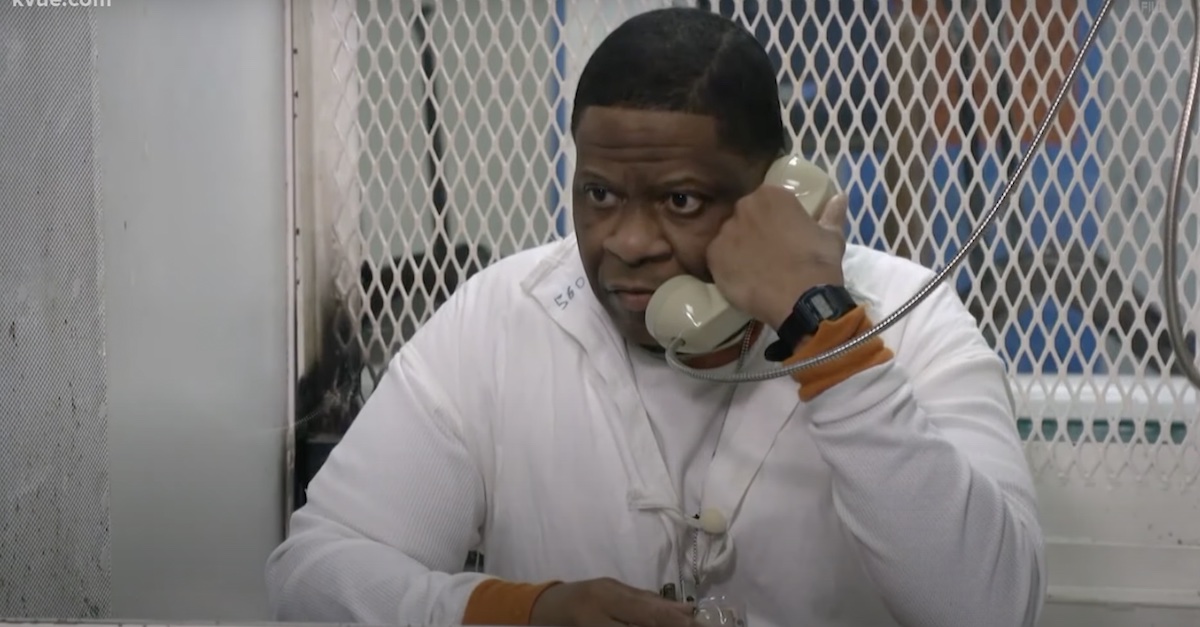
Rodney Reed
The justices heard oral arguments Tuesday in a Texas murder case involving DNA evidence, deadlines, and a Black man convicted of raping and murdering a white woman he maintains was his secret girlfriend.
Reed v. Goertz is on appeal from the U.S. Court of Appeals for the Fifth Circuit. Rodney Reed was sentenced to death for the 1996 rape and murder of Stacey Stites. Stites, 19, was found strangled with her own belt along a back road in Texas. An investigation revealed that intact sperm matching Reed’s genetic profile was found in the Stites’ body at the time of her death.
Reed has consistently argued that the medical findings were not the result of sexual assault, but rather, that he and Stites had been in a longstanding but secret consensual sexual relationship.
At trial, Reed argued that the real killer had likely been Jimmy Fennell, a local police officer and Stites’ fiancé. After Stites’ body was found, Fennell’s abandoned truck was found nearby, along with half of Stites’ belt. Since Reed’s conviction, some have argued that Reed may indeed be innocent of the crime.
After Reed was convicted and sentenced to death, he attempted to have DNA testing conducted on items that were discovered at the crime scene. He was unsuccessful in that bid. State courts ruled against Reed on the DNA issue four times. In 2019, Reed filed a federal civil rights suit which argued he was denied due process when the state refused to conduct DNA testing.
The U.S. Court of Appeals for the Fifth Circuit ruled that Reed’s civil rights case had been filed too late. His appeal of that ruling is now what is before the U.S. Supreme Court.
The primary legal issue before the justices is about the statute of limitations — and relevant to their inquiry are both the start and the end times that the statute runs. Reed argues that the appropriate statute only begins to run after all state court appeals have concluded. Texas, however, argues that the correct start date was at the trial court’s rejection of Reed’s request. Texas further argues that Reed’s case does not even belong in federal court and that Bryan Goertz, the local prosecutor Reed named as a defendant, is an improper party to the litigation.
The Supreme Court’s decision in Reed’s appeal will build on the 2011 case that initially permitted prisoners to bring civil rights claims if they were denied due process by a state’s refusal to conduct DNA testing.
Despite the potentially dramatic impact DNA evidence could have on Reed’s conviction, a rather subdued SCOTUS bench confined its questions to discussion of the interplay between various procedural rules.
Justice Clarence Thomas began by asking Parker Rider-Longmaid, Reed’s lawyer, “what liberty interest has your client been deprived of and by whom?”
The conversation quickly turned, however, toward narrower inquiries about when Reed’s cause of action properly accrued, and which rules about the start and end time of similar filings would be manageable by courts.
Using Reed’s suggested timeline, said Rider-Longmaid, would provide courts with a “simple, predictable, and sensible” system for allowing such claims.
Texas Solicitor General Judd Stone argued for the Lone Star State. Stone urged the justices to adopt his interpretation of filing deadlines in order to “discourage prisoners from manipulating” procedural rules.
During the oral arguments Tuesday, the justices gave little indication of how they were inclined rule in Reed’s case. Rather, their comments and questions, teasing out the nuances of legal concepts such as accrual and ripeness, were restricted to the highly technical analysis of calculating appropriate deadlines.
You can listen to the complete oral arguments here.
[Image via KVUE screengrab]
Have a tip we should know? [email protected]